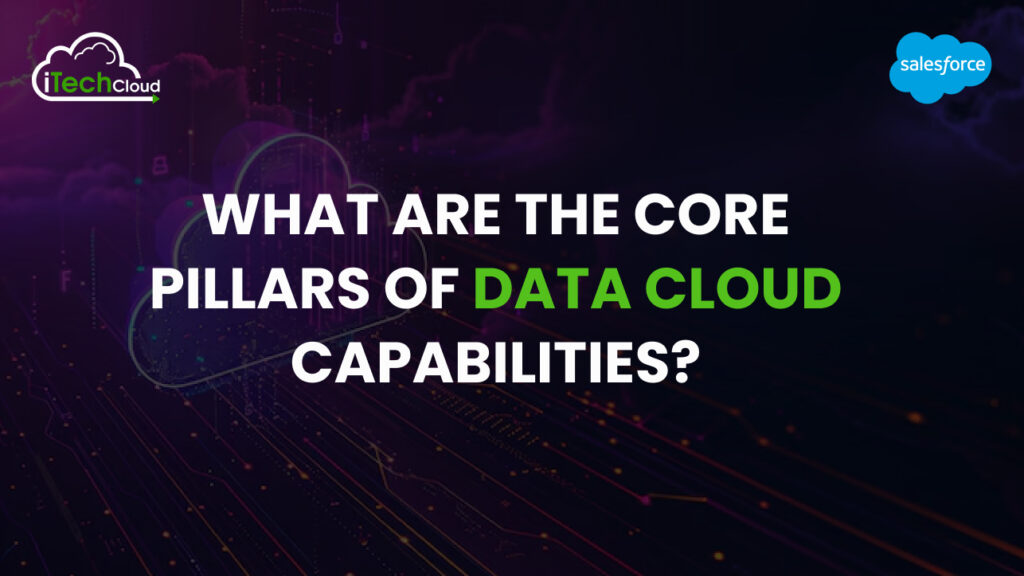What are the core pillars of data cloud capabilities?

In today’s hyper-connected digital ecosystem, data is not just a byproduct of business operations it’s a strategic asset. To harness its full potential, organizations are turning to data cloud solutions, which provide a unified, intelligent, and secure way to manage and activate data. But what truly makes Data Cloud powerful? At its core, the Data Cloud is built on a few essential pillars that define its capabilities and set it apart from traditional data systems.
Let’s explore the core pillars of Data Cloud capabilities and how they empower organizations to transform data into business value.
Table of Contents
1. Data Unification
The first and most fundamental pillar of any data cloud is data unification. In most organizations, data is scattered across various systems CRMs, ERPs, marketing platforms, support tools, and more. This siloed data creates inefficiencies and prevents teams from getting a complete picture of the customer or business performance.
Data Cloud solves this by ingesting and harmonizing data from multiple sources in real-time or near real-time. It standardizes data formats, resolves identity across different records (such as identifying that “Jon Doe” and “Jonathan D.” are the same person), and creates a unified customer profile or entity model.
This pillar ensures that all departments work with a single source of truth enabling better collaboration, more accurate insights, and consistent customer experiences.
2. Real-Time Data Processing
Speed is crucial in today’s dynamic environment. Whether it’s detecting fraud, personalizing customer experiences, or reacting to market changes, organizations need access to real-time data.
The real-time processing capability of a data cloud allows it to ingest, analyze, and act on data as it flows in. Unlike traditional data warehouses that rely on batch processing, Data Cloud enables low-latency data streaming and event-driven workflows.
This means businesses can instantly update customer profiles, trigger automation, and make decisions in the moment delivering agility and responsiveness at scale.
3. AI and Analytics Integration
Modern data clouds don’t just store and manage data they turn it into insights and actions. By integrating artificial intelligence (AI), machine learning (ML), and advanced analytics capabilities, Data Cloud empowers organizations to extract predictive and prescriptive insights from their data.
This can include customer behavior predictions, churn analysis, product recommendations, demand forecasting, and much more. Embedded analytics also allow for natural language querying and visualization, so non-technical users can explore data without writing complex code.
This pillar democratizes data intelligence across the organization and fuels data-driven decision-making.
4. Security and Governance
Data privacy, compliance, and security are non-negotiables. A robust Data Cloud is built with enterprise-grade security and governance at its foundation.
This includes features like
- Role-based access control (RBAC)
- Data encryption at rest and in transit
- Audit trails and activity monitoring
- Compliance with regulations (like GDPR, HIPAA, etc.)
Additionally, data cloud platforms provide data cataloging, lineage tracking, and policy management to ensure data is used ethically, legally, and safely.
This pillar ensures organizations can scale their data operations without compromising trust or compliance.
5. Data Activation and Integration
The true value of data lies not just in analysis but in activation. Data Cloud enables businesses to use unified and enriched data across different systems like CRM, marketing automation, customer service, and custom apps.
For example, Salesforce Data Cloud allows marketers to personalize journeys based on real-time customer behaviors or service reps to resolve issues faster with a complete 360-degree view of the customer.
By connecting insights to actions, this pillar makes data truly operational enhancing productivity, personalization, and performance across the business.
Conclusion: Data Cloud Capabilities
The Data Cloud Capabilities is more than just a data storage solution it’s a strategic platform that turns raw data into a competitive advantage. With pillars like data unification, real-time processing, AI integration, security, and activation, it lays the foundation for smarter, faster, and more connected enterprises.

